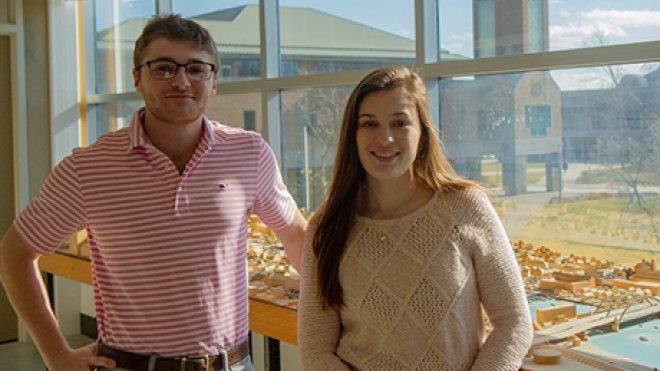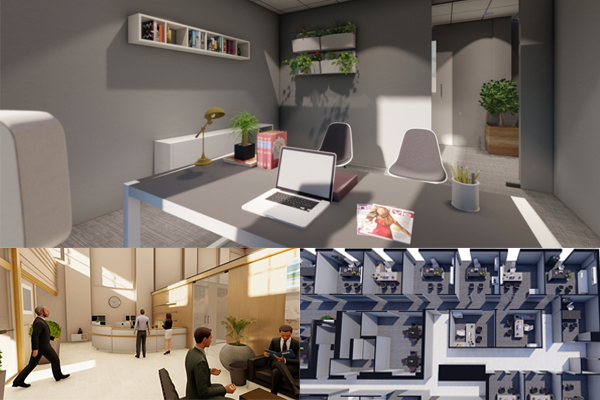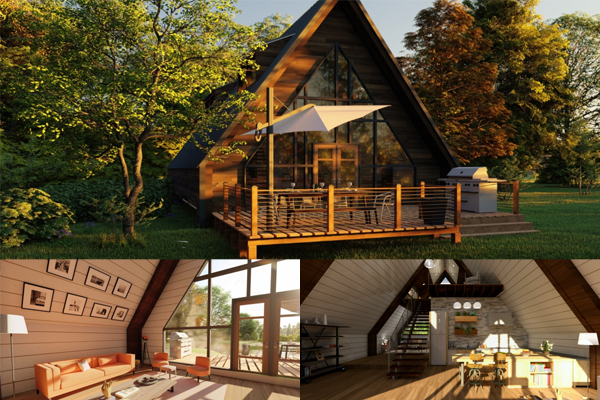Undergraduate Entrepreneurs Break into Professional Industry with Independent Design Company
Senior architecture students Nicholas Pyles and Julia Collopy started their business, MyriadVision, to offer design services to real-world clients

BRISTOL, R.I. – Turning a traditional bank into an innovative and modern-day office building was exactly the type of challenge co-founders Nicholas Pyles ’19 and Julia Collopy ’19 hoped for when they launched MyriadVision. Now, in addition to being full-time architecture students, the pair work with real-world clients to create design renderings for anything from small rooftop gardens to major city plans spanning hundreds of acres including more than 20 building structures.
“MyriadVision began as an ambitious idea from a lot of inspiration,” Pyles said. “We struggled in the beginning and our first client definitely went out on a limb for us. But as we went through that project and then the next one and the next one, we’ve finally found our niche.”
MyriadVision is an independent company that offers three-dimensional photo-real rendering services to architects, designers, construction companies, real estate firms and more. The idea developed after Pyles attended the Grassroots conference in Washington D.C. as a member of the RWU chapter of the American Institute of Architectural Students. After returning to RWU, he approached Collopy who quickly jumped on board.
“Nick told me his idea and immediately I was all for it,” Collopy said. “Of course, there were some doubts, but really what could we lose?”

As undergraduate students who don't yet have architectural licenses, they tuned into the other skills they’ve developed through RWU’s architecture program and various internships with professional firms. Both students found they had a strength in creating high-detailed models and renderings that when finished, looked exactly like a photograph.
Pyles and Collopy were full of inspiration and determination to get down to work until they hit two major roadblocks: how to legally register as a business and how to acquire clients.
Not knowing where to start, Pyles and Collopy reached out to architecture professors, friends and alums that were business majors, previous mentors and internship supervisors to gather as much information and advice as possible. Fortunately, becoming a business was easier than they expected.
“Three simple forms and $150 later, we were registered as a company and legally recognized as a business entity,” Pyles said. “We’re registered in Pennsylvania because it’s where I’m from, but because we’re not brick and mortar, there aren't any other certifications we need because we’re considered freelancers.”
With one roadblock out of the way, now it came to acquiring clients. They turned to their RWU professors, sent emails to local businesses and looked on various freelance websites like UpWork and PeoplePerHour. Within the next month, MyriadVision landed its first client.
Since then, Pyles and Collopy pick up new jobs every week, averaging two-three different projects each month.
The RWU Foundation
Through the intensive nature of RWU’s architecture program, Pyles and Collopy already had a strong foundation for the technical skills in building and creating designs. However, what surprised them the most was how large a role the interpersonal skills played in the success of their business enterprise.

“The projects we’ve done through Myriad we took from the skills and knowledge we’ve learned from school projects and just implemented our own design aesthetic,” Pyles said. “But within architecture, you do a lot of speaking in front of people to propose projects or through desk [critiques] with professors, so we’ve taken all those public speaking skills and use them when talking with clients,” Pyles said.
“Last year, we were in a studio that partnered with the Community Partnerships Center and worked with the Whaling Museum in Nantucket which was definitely helpful in learning about how to go to a client and talk to them to know exactly what they want in a project,” Collopy added.
But it’s not just the courses and studio time that have been influential throughout their journey. With a studio size of no more than 20 students, the ability to connect and build relationships with professors has been invaluable to Pyles and Collopy. Professors like Gary Graham and Robert Dermody have been extremely supportive by getting them in contact with potential clients, advising them on good business strategies or by just simply telling them how great a job they’re doing in the professional world.
“I love that communication you get with the professors. They always encourage you to go to their office and talk to them after class if you need help with a project or anything else,” Collopy said.
Pyles and Collopy are focused on continuously growing MyriadVision, in hopes of one day taking the business on fulltime. And while it can be tough to balance schoolwork, studio projects and a growing business, the pair agrees that “it’s all worth it in the end.”